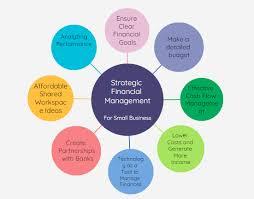Running a business, big or small, always comes down to one thing—managing money the right way. Over the years, I’ve learned that financial management isn’t about complicated spreadsheets or long reports. It’s about understanding where your money comes from, where it goes, and how to keep it working for your goals. When I first started handling business finances, I made it a point to focus on the basics: tracking expenses, planning budgets, and keeping cash flow steady. These steps might sound simple, but they’re what keep a business stable and ready to grow.
I’ve always believed that effective financial management is the backbone of success. Without a clear picture of your finances, it’s hard to make smart decisions. Whether you’re managing a startup, an online store, or even a brand in the vaping industry, keeping track of money helps you stay in control and plan for the future. Just like in my daily life, where I keep balance between work and relaxation, such as enjoying a Raspberry Peach Mr Fog Max Pro while reviewing my numbers, the key lies in staying consistent and mindful of every choice you make.
Understanding the Importance of Financial Management
Every successful entrepreneur understands that managing finances effectively is more than just balancing income and expenses—it’s about building a strong foundation for sustainable growth. I make sure that every financial decision aligns with my long-term goals. That’s what helps me stay ahead, even when the market changes or unexpected expenses arise.
Here’s why managing finances is so essential:
-
Maintains Cash Flow: Without cash flow, a business can’t operate. I always make sure my incoming revenue covers my outgoing costs and leaves a buffer for emergencies.
-
Supports Growth: Financial planning helps me allocate funds toward areas that help the business expand—marketing, technology, or inventory.
-
Prevents Overspending: Tracking every expense gives a clear picture of what’s necessary and what can be optimized.
-
Improves Decision-Making: When I know my numbers, I make better decisions about pricing, investments, and scaling up.
I’ve learned that consistency in managing finances creates confidence. Knowing exactly where I stand allows me to plan more effectively and take calculated risks when needed.
How I Track and Plan My Business Finances
Managing business money isn’t something I leave to chance. I make it a habit to track every transaction, no matter how small. From daily sales to marketing expenses, I record everything to stay organized and clear.
Here’s the process I follow to stay on top of my business finances:
-
Use a Budgeting System: I start with a realistic budget that outlines income, fixed costs, and variable expenses. This keeps me from overspending and ensures I have money set aside for future needs.
-
Track Every Expense: I log expenses daily. It helps me identify where I might be spending more than necessary.
-
Separate Business and Personal Finances: This one’s important. Keeping business and personal funds separate prevents confusion and makes tax time easier.
-
Monitor Cash Flow Weekly: I check my cash flow regularly to make sure I’m not running short. It also helps me forecast upcoming expenses.
To make this process easier, I use simple accounting tools that help automate tracking. That gives me more time to focus on strategy and growth instead of just managing paperwork. The same balance applies to my lifestyle—I work hard on planning and execution, but I also take a few moments to relax, maybe with a mr fog max pro, while reflecting on how the numbers are shaping my next move.
Investing Wisely for Long-Term Growth
Effective financial management isn’t only about saving—it’s also about investing in the right areas. Every business has opportunities to grow, but the key is knowing where to invest for maximum return. I make it a point to evaluate potential investments based on real data and realistic outcomes.
Here’s what I focus on when making investment decisions:
-
Reinvest in the Business: A part of every profit I make goes back into improving operations, marketing, and customer experience.
-
Upgrade Technology: Investing in efficient systems and tools saves both time and money in the long run.
-
Diversify Revenue Streams: I look for ways to expand offerings or enter new markets to keep revenue stable.
-
Plan for the Future: Whether it’s saving for expansion or setting aside funds for slower months, planning ahead ensures long-term stability.
One thing that has helped me immensely is treating business finances as a living system—it grows, adapts, and evolves. I don’t just look at numbers; I look at trends. That mindset helps me spot opportunities early and act on them confidently.
Building Financial Discipline and Habits
Good financial management comes down to habits. Just like staying consistent with fitness or maintaining a routine, managing money requires discipline. Over time, these small habits create a big impact.
Here are some habits I practice regularly:
-
Review Finances Monthly: I sit down at the end of every month to review financial reports. It helps me spot trends and make adjustments quickly.
-
Plan Taxes Early: Staying proactive about taxes avoids surprises later.
-
Build an Emergency Fund: Having a small reserve of funds keeps me prepared for unexpected expenses.
-
Set Clear Financial Goals: I set measurable goals—monthly revenue targets, savings milestones, or investment plans—to stay motivated.
These habits have shaped the way I view business growth. It’s not about making quick gains; it’s about creating stability that lasts. I approach it the same way I approach my downtime—steady and consistent. Sometimes, after wrapping up a week of reviewing my numbers, I take a short break, maybe enjoy a few quiet minutes with my mr fog vape, and appreciate how the small steps I’ve taken continue to move the business forward.
Financial Management as the Core of Business Success
Over time, I’ve realized that managing finances effectively is about balance. It’s about knowing when to save, when to spend, and when to invest. The more disciplined and organized I am, the more freedom I have to make strategic decisions. It’s not just about keeping records—it’s about understanding the story those numbers tell.
I’ve learned that consistency pays off. When I maintain financial clarity, I can focus on innovation, marketing, and building relationships with customers. I can take opportunities with confidence, knowing that my finances are in order.
Managing business finances effectively doesn’t have to be complicated. It’s about being mindful, making informed decisions, and keeping track of every detail. Just as in daily life, success comes from balance. Whether I’m analyzing financial data or taking a quiet moment with a Raspberry Peach Mr Fog Max Pro, it’s all about creating a rhythm that supports growth, stability, and long-term success.



